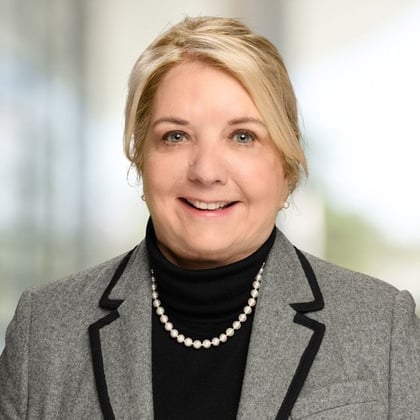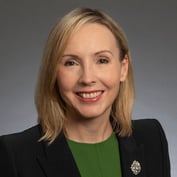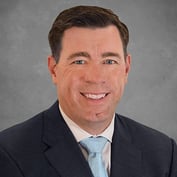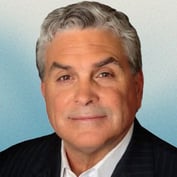Five stubbornly persistent myths have turned off women from becoming financial advisors, and Peggy Ruhlin, retired board chair and CEO, 2000-2019, of Budros, Ruhlin & Roe, is here to shoot down all of them.
In an interview with ThinkAdvisor, the first myth she shatters is, as she frames it: “To be really good at math is to excel in this field.”
Rather, she argues, “If you can add, subtract, multiply and divide, you have all the math skills you need to be a financial advisor.”
Ruhlin passionately wants to bring more women into the wealth management and financial planning field, and a book she has penned attests to that.
“Wealth is Women’s Work: How Women Can Make a Long-term Impact with a Career in Wealth Management” (Advantage-2022) delivers an authentic picture of what being a financial advisor entails and the rewards therein.
Most of all, Ruhlin wants women and men alike to know that, as she says, “financial planning isn’t a man’s world anymore.”
Ruhlin’s first career was working as a successful CPA. She decided to switch to financial planning partly because “tax season was just soul-crushing,” she says.
Even during the rest of the year, because of inflexible job demands, she had little free time and was unable to schedule family vacations.
She became a certified financial planner in 1986 and began offering financial planning as an add-on to her accounting services.
The following year she joined Columbus, Ohio-based Jim Budros in his planning practice that served high net worth clients.
Over the next 34 years, Ruhlin would rise to become CEO, then chair of the board of directors.
In the interview, she opines on what firms must do to attract more women to be advisors.
“To be their most successful, they have to have women on their team and women lending their voice to how the firm is run,” she stresses.
Among other awards, Ruhlin has won the Foundation for Financial Planning’s Alexandra Armstrong Award for Lifetime Achievement and was named to the Financial Times’ FT 100 list of female financial advisors in 2014.
She retired from Budros, Ruhlin & Roe in 2019 (CI Financial acquired the firm, with $3.5 billion in assets under management, in 2021) and became a special advisor at DeVoe & Co., counseling RIA owners seeking to grow their firms.
ThinkAdvisor recently interviewed Ruhlin, who was speaking by phone from Columbus.
Shattering the widespread misconception, among women in particular, that financial planning is “boring,” she maintains: “This job is all about working with people, not with abstract numerical constructs.”
Here are highlights of our conversation.
THINKADVISOR: Why was it important for you to write this book?
PEGGY RUHLIN: When I got my CFP designation in 1986, I was told that only 25% of all CFPs in the nation were women. Today, that number is [23.6%, as of 2022].
So we’ve been going in the wrong direction for more than 30 years!
My goal is to bring more women into the wonderful profession of wealth management and financial planning.
In your book, you write of long-standing myths about financial planning careers that deter women from entering the industry. Let’s start with this one: “To be really good at math is to excel in this field.”
If you can add, subtract, multiply and divide, you have all the math skills you need to be a financial advisor.
Some people, particularly women, have it in their heads that this job is all about doing calculations, stock valuations and elaborate future value analyses — and all day you just sit in front of a computer and do math.
Yes, you have to have the basics. But for the most part, the computer does the math for you. You don’t need to have had A’s in calculus to succeed as a wealth manager or financial planner.
Another myth you bust about being an FA: “It’s boring.”
Once again, that’s [the notion] that you sit at a computer all day or do math or research stocks. It’s not that at all.
This job is all about working with people, not with abstract numerical constructs. This is about counseling people, helping them achieve goals — and you get a great payback from your clients when you help them.
Here’s a big myth: “Financial planning is a man’s field.” Therefore, you want people to focus on the mantra, “Financial planning isn’t a man’s world anymore.”
Yes. It was true before. It was very hard to break into the financial consulting, planning, wealth management world.
The only way a woman could go to work for a big brokerage house was as a sales assistant, typing letters and answering phones because they just wouldn’t hire women [to be advisors].
Firms felt women didn’t have the right personalities or the right skill sets. They weren’t cutthroat enough, or whatever.
So then there’s the myth of: “I don’t have the right skills,” which often “segues into ‘I don’t want to be a salesperson,’” you write.
There are certainly firms where your skills as a salesperson will be critical to your success, where you’ve got to sell life insurance policies, annuities, this or that product.
But the field is so much more open and wider now and emphasizes service versus sales.
It’s not all about selling product anymore. There are certainly firms that sell product, and that’s a large part of what they do.
But there’s a whole other big segment of the profession that’s there for counseling and helping people. And the whole fee-only part of our world doesn’t sell product at all.
Of course, you still have to sell yourself to your prospective clients and sell them on the fact that your firm is best for them.
What about the myth, “CFPs only work with rich people”? You say that’s “a destructive myth” because “it turns off a lot of younger potential employees.”








 September 18, 2023 at 05:06 PM
September 18, 2023 at 05:06 PM












 Copyright © 2024 ALM Global, LLC. All Rights Reserved.
Copyright © 2024 ALM Global, LLC. All Rights Reserved.